Welcome to the world of digital commerce. Online marketplaces are bustling digital arenas where buyers and sellers converge, each finding value and convenience in this platform that transcends traditional geographic constraints.
An online marketplace is synonymous with an e-commerce site from where third parties derive product or service information. Generally, the marketplace operators process these transactions. Marketplaces can be classified based on their business model – B2C, B2B, C2C, or hybrid. Examples of successful online marketplaces include giants like Amazon, eBay, and Airbnb, which have revolutionized how we shop and interact.
Defining Your Marketplace Concept
Start by pinpointing your niche market. It could be anything from handmade crafts to vintage clothing. Understand your target audience – their needs, preferences, and shopping behaviors. The value proposition of your marketplace should clearly communicate the unique benefits that customers can only gain from your marketplace. If you are planning for an online marketplace, it is better to opt for ecommerce web developmentservices instead of turning to a no-code solution.
What are the Basic Features of an Online Marketplace?
Here are a few features that characterize online marketplaces:
They aggregate supply and demand: Online marketplaces are meeting places for buyers and sellers. They aggregate supply, making it easier for buyers to find what they are looking for, and they aggregate demand, giving sellers access to a large number of potential customers.
They facilitate transactions: Online marketplaces typically provide the infrastructure to facilitate transactions between buyers and sellers. This often includes payment processing, dispute resolution, and sometimes even shipping services.
They have network effects: The value of an online marketplace to its users typically increases as more people use it. The more sellers there are in a marketplace, the more likely it is that buyers will find what they’re looking for. Conversely, the more buyers there are, the easier it is for sellers to sell their products or services.
They provide trust and security: Online marketplaces often have systems in place to ensure that transactions are secure and that both buyers and sellers are protected. This might include buyer and seller protections, secure payment processing, and systems for rating and reviewing users.
These features have made online marketplaces a popular choice for both buyers and sellers, leading to their significant growth in recent years.
How to Plan for Building an Online Marketplace?
Planning an online marketplace involves a number of key steps, each of which requires careful consideration.Your business model must lay out how you plan to run your online marketplace. Will it be commission, subscription, or listing fee-based, or a combination? Determine the rules and policies for sellers to maintain a smooth operation and customer satisfaction.
Here’s a step-by-step guide:
Identify Your Niche: Before building an online marketplace, you need to identify the niche you want to serve. This means understanding the specific needs and wants of a particular group of buyers and sellers. Look for gaps in the market, analyze your competition, and decide what you can offer that’s different and better.
Design and Usability Considerations
Design is pivotal. A well-designed user interface enhances user experience, encouraging visitors to stay and explore. Prioritize key features such as a robust search function, user reviews, and a secure and easy checkout process. Ensure your website is mobile-responsive and compatible with different browsers for optimum accessibility.
Choosing the Right Technology Stack
Selecting the right technology is critical for scalability and functionality. Advanced e-Commerce development platforms like Magento, Shopify, and Woocommerce and frameworks such as ReactJS and Django are commonly used for creating online marketplace. While custom development offers flexibility, SaaS solutions can provide faster and simpler deployment.
Building Your Marketplace
With your plans and designs in place, it’s time to build. You may need to hire developers or a development agency if you don’t possess the necessary technical skills. Thorough testing should be done to ensure a seamless user experience.
Secure Payment and Shipping Integration
A trusted payment gateway is crucial to foster trust with your users. Stripe, PayPal, and Square are reliable options. Shipping integration is also vital for physical goods, offering options like flat rate, free, or calculated shipping.
Implementing Legal Frameworks
The Terms of Service and Privacy Policies should be transparent, protecting both you and your users. It’s essential to understand your legal responsibilities as a marketplace operator, especially with respect to data protection and financial transactions. Consider consulting with a legal professional for advice.
Effective SEO and Marketing Strategies for Online Marketplaces
SEO improves your website’s visibility on search engines, while marketing tactics, including PPC advertising, social media marketing, and content marketing, attract and retain customers. Social media platforms are excellent for engaging with your audience and promoting products.
Launching and Growing Your Online Marketplace
Before launching, double-check everything – your website’s functionality, legal frameworks, and payment and shipping options. For growth, consider strategies like referral marketing, influencer partnerships, or loyalty programs. Consistently engage with your user community and seek feedback.
Maintenance and Continuous Improvement
Regular maintenance ensures your website remains functional and up-to-date. Monitor user behavior to gain insights and identify areas for improvement. Feedback is gold – encourage it and use it to enhance user experience and satisfaction. In the entire process, you can analyze both successful and failed marketplaces to learn. Understand the strategies that worked, and you can always seek assistance from a professional ecommerce web development company.
What are the Benefits of Online Marketplaces?
Online marketplaces offer numerous benefits to both buyers and sellers. Here are some of the key advantages:
Convenience: For consumers, online marketplaces offer convenience. They can browse, compare, and purchase goods and services from their home or anywhere they have internet access and at any time of day. They save consumers time and energy that would otherwise be spent traveling to physical stores.
Variety: Online marketplaces provide a wider variety of goods and services than a single online store or a physical store. Buyers have the advantage of exploring a range of products from different vendors all in one place.
Competitive Pricing: Since multiple vendors list their products on the same platform, there is usually competitive pricing. Buyers can compare prices from different sellers and choose the most affordable or best value option.
Trust and Security: Many online marketplaces have robust security measures in place to protect transactions. They also often offer dispute resolution services, protecting both buyers and sellers from fraud. User reviews, and ratings provide additional trust signals, helping customers make informed purchasing decisions.
Access to Larger Customer Base: For sellers, an online marketplace provides access to a larger customer base than they might be able to reach through their own individual websites or physical stores. This can potentially lead to increased sales and revenue.
Reduced Marketing Costs: Online marketplaces usually take care of a lot of marketing, attracting customers to their platforms through various advertising efforts. This saves individual sellers from having to invest as much in marketing and customer acquisition.
Ease of Use and Management: Most online marketplaces provide sellers with user-friendly interfaces for managing their product listings, orders, and customer communications. They also typically handle payment processing, making it easier for sellers to focus on their products and customer service.
Data Insights: Sellers can gain valuable insights from data provided by the marketplace, such as what products are trending, customer behavior, and more. This data can be used to optimize their product offerings and marketing strategies.
Global Reach: Online marketplaces allow businesses to expand their reach beyond their local areas and sell their products or services globally. This is a significant advantage for businesses looking to scale.
Faster Go-to-Market Time: Since the marketplace is already set up and has an established customer base, sellers can quickly get their products in front of customers without needing to build a website from scratch or establish their own physical store.
In essence, online marketplaces facilitate a more efficient and wide-reaching form of commerce, benefiting both consumers and businesses.
Final Words
Building an online marketplace website from scratch is an exciting venture. It’s a process that requires planning, execution, monitoring, and constant improvement. The key to a successful online marketplace lies in understanding your target audience, offering them unique value, and continuously enhancing their experience on your platform. With careful planning and dedication, and by employing the strategies discussed here, you are well-equipped to build your very own successful online marketplace website from scratch. We’ve discussed the fundamentals, from defining your marketplace concept, design considerations, and technology selection to marketing strategies and beyond. Now it’s your turn to bring your unique marketplace idea to life!





